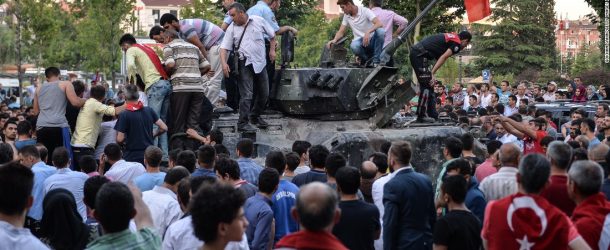Had the attempt to overthrow the Turkish government succeeded the morning of July 16, it would have been the fourth coup in Turkey’s modern history. The last was that of General Kenan Evren, Chief of Staff of the Turkish Army, against the government of Süleyman Demirel in 1980, which was followed by a repressive military dictatorship that lasted three years and introduced a new constitution, still in force today.
What makes this coup different from the previous ones is its consequences. If the Turkish army considers itself the guarantor of the principles under which Mustafa Kemal Atatürk’s Republic was founded -respect for pro-Western values and secularism-, the coup’s failure last Saturday -the first in the putschist history of modern Turkey- will undoubtedly elevate Erdoğan to hero status. A hero who did not hesitate to ask the unarmed people to face the tanks to defend him. The Turkish people showed their courage and devotion to its president in defiance of martial law. Erdoğan returned triumphantly from his holiday and thanked God “for giving him the opportunity” to purge and reform the army.
Atatürk’s heirs are wary of the Islamist Justice and Development Party (AKP), founded by Erdoğan himself, as they believe in the existence of a hidden agenda to dismantle the secular republic. After coming to power in 2002, Erdoğan was swift to obliterate the Kemalist regime and restrict army control over civilian politics, hiding behind the European Union’s conditions to begin accession negotiations .
Following initial timid reforms, Erdoğan has veered away from the democratic path encouraged by the EU, concentrating all power in his hands. After losing the parliamentary majority in last year June elections, in which the pro-Kurdish Democratic People’s Party (HDP), overcame the 10 % threshold for parliamentary representation for the first time in history, and the impossibility to form a government, Erdoğan made a series of decisions of dubious legitimacy that have resulted in even greater political polarization and insecurity in the country.
On the repeated 1 November 2015 election, the inflaming Turkish nationalist sentiment following the resumption of hostilities between the Turkish army and the Kurdistan Workers’ Party (PKK), gave Erdoğan the majority he needed to govern alone while the HDP suddenly found itself at the edge of losing its representation in the parliament. At the request of the AK Party, the Turkish parliament has recently passed a bill to strip 130 MPs of their legal immunity from prosecution, including almost all the parliamentarians from HDP, which could end in jail for allegedly “glorifying terrorism”.
The bomb that hit the Grand National Assembly of Turkey during last Friday’s military uprising seems to symbolize Erdoğan’s intentions to change the current parliamentary system to a presidential one.
Even in his innermost thoughts, Erdoğan could have never imagined garnering such political support in return for having faced the people with a rebel army whose outcome could have been a bloodbath of unprecedented proportions.
Laura BATALLA
This article was originally published in La Vanguardia on 17 July 2016.

























































